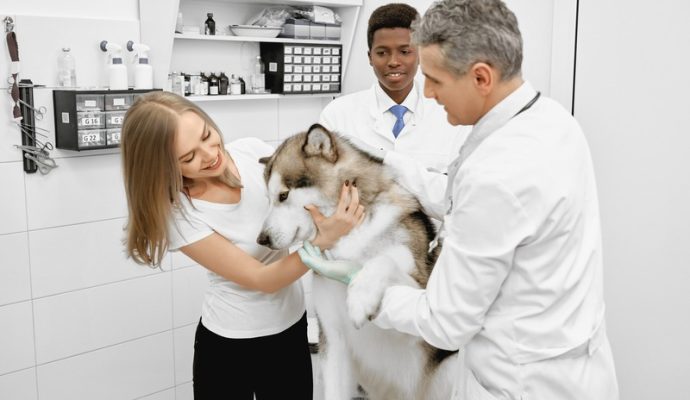As a pet owner, you want the absolute best for your furry companion. Part of ensuring they have a happy and healthy life is taking them for regular check-ups. Veterinary appointments can sometimes be overlooked, underappreciated, or viewed with trepidation by both pets and owners. Yet, they remain a crucial component of responsible pet ownership. Understanding what to expect during your pet’s check-up will help alleviate any anxiety and prepare you for a smooth, informative visit.
Routine Exams for Pets
Regular check-ups are vital in maintaining your pet’s health. For canines, a dog wellness exam is an excellent opportunity to identify any potential health issues before they become serious. This annual visit includes many of the evaluations mentioned earlier. Think of it as a comprehensive health audit, ensuring your dog stays on the path to a long and healthy life.
Expectations During Your Pet’s Check-Up
1. Welcoming Environment and Initial Observations
Upon arriving at the veterinarian’s office, you’ll be greeted by a team dedicated to the well-being of animals. From the moment you walk in, subtle evaluations begin. Staff will observe your pet’s behavior, mobility, and overall demeanor. Pets that are bright, alert, and responsive generally indicate good health, while signs of distress can prompt further examination.
2. Weight Check
A weight check is often one of the initial steps in a veterinary examination. Monitoring your pet’s weight is a fundamental indicator of their health. Obesity can lead to various health concerns, including joint issues, diabetes, and cardiovascular problems. Regular weight checks help identify changes that may require adjustments in diet or lifestyle.
3. Comprehensive Physical Examination
The veterinary staff will conduct a thorough physical examination to assess various aspects of your pet’s overall health. This includes
- Coat and Skin Examination: Checking for irregularities such as lumps, bumps, rashes, or parasites on the coat and skin. Skin conditions can be indicative of allergies, infections, or underlying health issues.
- Ears and Eyes Inspection: Examining the ears and eyes for signs of infection, disease, or abnormalities. Ear infections, in particular, are common in pets and can be addressed with appropriate treatment.
- Teeth and Gums Assessment: Evaluating the condition of the teeth and gums is crucial for dental health. Dental issues can lead to pain, difficulty eating, and systemic health problems. Recommendations for dental care, including cleaning or treatments, may be provided.
- Abdominal Palpation: Palpating the abdomen to check for any abnormalities, enlargement of organs, or signs of discomfort. This helps in assessing the condition of internal organs and identifying potential issues.
- Cardiovascular and Respiratory Examination: Listening to the heart and lungs with a stethoscope to assess cardiovascular and respiratory health. Irregularities in heart sounds or breathing patterns may indicate underlying problems that require further investigation.
4. Pet Palpation and Mobility Evaluation
Palpation involves the use of hands to examine the body and can reveal a lot about a pet’s health. In addition, your veterinarian will assess your pet’s joints and muscles to ensure their mobility is not being hindered and that there are no signs of pain or discomfort, which could indicate conditions like arthritis.
5. Cardiac Check
One key aspect of the physical exam is listening to your pet’s heart. Early detection of heart conditions can significantly improve the management and outcome. Irregular rhythms or heart murmurs can signal the need for further investigation.
6. Laboratory Tests and Diagnostics
Beyond the physical examination, your vet may suggest a variety of laboratory tests. Blood work is a fundamental part of veterinary care. It provides a detailed picture of your pet’s internal health and can detect conditions such as diabetes, kidney disease, or infections. Urinalysis helps assess kidney function and checks for urinary tract infections. Fecal exams are also important, as they can reveal the presence of intestinal parasites.
7. Nutrition and Exercise Guidance
During your visit, there will be an open dialogue between you and the veterinary staff. It’s the perfect time to discuss nutrition, as diet plays a pivotal role in your pet’s health. Exercise routines, behavioral concerns, and lifestyle accommodations might also be topics of discussion depending on your pet’s needs.
8. Pet Owner Education
An essential part of the check-up is educating you as the pet owner. Vets can provide valuable insights into animal care, behavioral training tips, and ways to enrich your pet’s life. This exchange of information empowers you to make the best choices for your pet’s health.
Sometimes, check-ups can lead to the discovery of issues that may require surgical intervention. When discussing dog surgery, it’s important to understand the reasons behind it, the risks involved, and the post-operative care needed. This could range from routine spaying or neutering to more complex procedures like removing a mass or repairing a torn ligament.
9. Pet Vaccination
Vaccinations are a critical preventative measure. They protect your pet from various diseases and contribute to overall public health by curbing the spread of infections. When it comes to canines, dog vaccines are administered according to a schedule that your vet will discuss with you. Regular immunizations for parvovirus, distemper, and rabies, among others, are essential to keeping your dog protected.
10. Follow-up and Ongoing Care
After a check-up, your veterinarian may suggest a follow-up appointment, particularly if there are health concerns that need monitoring. Ongoing care might include medication management, weight loss plans, or rehabilitation therapies. It’s imperative to stick to the recommended schedule to ensure your pet stays in top condition.
Conclusion
In the end, a visit to the vet for a check-up can provide immense peace of mind. Knowing that your beloved pet is healthy or getting early treatment for any issues is invaluable. Remember, regular check-ups are not just about addressing current concerns but are also a proactive step in preventing future health problems. With this guide on what to expect, you’re well-prepared for your next visit, ensuring it’s as stress-free and productive as possible for both you and your furry friend.




